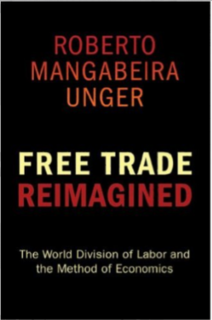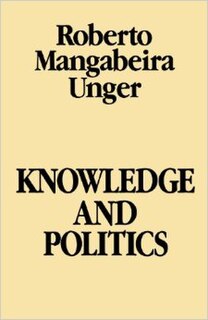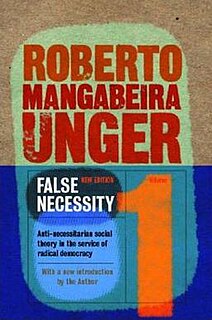 W
WThe Critical Legal Studies Movement is a book by the philosopher and politician Roberto Mangabeira Unger. First published in 1983 as an article in the Harvard Law Review, published in book form in 1986, and reissued with a new introduction in 2015, The Critical Legal Studies Movement is a principal document of the American critical legal studies movement that supplied the book with its title. In the book, Unger argues that law and legal thought offers unrealized possibilities for the self-construction of a more democratic society, and that many lawyers and legal theorists have uncritically surrendered to constraints that undermine their ability to make use of law's transformative potential. Unger explains how the critical legal studies movement has refined and reformulated the major themes of leftist and progressive legal theorists, namely the critique of formalism and objectivism in legal doctrine, and the purely instrumental use of legal practice and doctrine to advance leftist aims, and in doing so, has identified elements of a constructive program for the reconstruction of society.
 W
WDemocracy Realized: The Progressive Alternative is a 1998 book by philosopher and politician Roberto Mangabeira Unger. In the book, Unger sets forth a program of "democratic experimentalism" that challenges and defies the neoliberal consensus that there are few alternatives for the progressive reform of democratic and market structures.
 W
WFree Trade Reimagined: The World Division of Labor and the Method of Economics is a 2007 book by philosopher and politician Roberto Mangabeira Unger. In the book, Unger criticizes the doctrine holding that maximization of free trade should be the commanding goal of the worldwide trading regime, contending that this doctrine is misguided. Instead, Unger argues, the goal of an open worldwide trading regime should be reconciled with measures that foster national and regional diversity, deviation, heresy, and experiment in production, markets and economies. Unger further explores how the tradition of marginalism has rendered the discipline of economics incapable of offering deep insight into the problems of trade and of the global division of labor.
 W
WThe Future of American Progressivism: An Initiative for Political and Economic Reform is a 1999 book co-written by philosopher and politician Roberto Mangabeira Unger and philosopher, activist and public intellectual Cornel West. In the book, Unger and West describe a central tradition in American social thought that they call "the American religion of possibility." Arguing that economic inequality, political impasse, and increasing isolation of Americans from each other has called that tradition into question, Unger and West present a plan for increasing economic equality and deepening democracy so that the United States better fulfills the promises of the American religion of possibility.
 W
WKnowledge and Politics is a 1975 book by philosopher and politician Roberto Mangabeira Unger. In it, Unger criticizes classical liberal doctrine, which originated with European social theorists in the mid-17th century and continues to exercise a tight grip over contemporary thought, as an untenable system of ideas, resulting in contradictions in solving the problems that liberal doctrine itself identifies as fundamental to human experience. Liberal doctrine, according to Unger, is an ideological prison-house that condemns people living under its spell to lives of resignation and disintegration. In its place, Unger proposes an alternative to liberal doctrine that he calls the "theory of organic groups," elements of which he finds emergent in partial form in the welfare-corporate state and the socialist state. The theory of organic groups, Unger contends, offers a way to overcome the divisions in human experience that make liberalism fatally flawed. The theory of organic groups shows how to revise society so that all people can live in a way that is more hospitable to the flourishing of human nature as it is developing in history, particularly in allowing people to integrate their private and social natures, achieving a wholeness in life that has previously been limited to the experience of a small elite of geniuses and visionaries.
 W
WLaw in Modern Society: Toward a Criticism of Social Theory is a 1976 book by philosopher and politician Roberto Mangabeira Unger. In the book, Unger uses the rise and decline of the rule of law as a vehicle to explore certain problems in social theory. According to Unger, problems that were central concerns of classical social theorists like Marx, Durkheim, and Weber—the problems of explanation, order, and modernity—remain unsolved. Unger contends that the failure of classical social theory to solve these dilemmas can be traced to the way in which it asserted its independence from the ancient political philosophers, namely in its denial of a supra-historical human nature and in its insistence upon the contrast of fact and value. Unger argues that a radical reorientation of social theory is needed to solve the problems it faces. "To carry out its own program," Unger writes, "social theory must destroy itself." The rise and decline of the rule of law, and the dilemmas of social theory, converge in the need to be able to compare and criticize different forms of society, in order to be able to more effectively submit the organization of society to the human will.
 W
WThe Left Alternative is a 2009 book by philosopher and politician Roberto Mangabeira Unger. In the book, Unger identifies problems with contemporary leftism and proposes a way to achieve the goals that he believes should be central to the progressive cause: inclusive economic growth through the heating up of politics and democratizing the market economy, a relentless process of institutional innovation that depends less upon crisis for change, and depends more on shortening the distance between context-preserving and context-transforming moves. The Left Alternative was first published in 2006 as What Should the Left Propose?
 W
WPassion: An Essay on Personality is a philosophical inquiry into human nature by philosopher and politician Roberto Mangabeira Unger. The book explores the individual and his relation to society, asking how one comes to an understanding of self and others. Unger here sees the root human predicament as the need to establish oneself as a unique individual in the world but at the same time to find commonality and solidarity with others. This exploration is grounded in what Unger calls a modernist image of the human being as one who lives in context but is not bound by context.
 W
WPolitics: A Work in Constructive Social Theory is a 1987 book by philosopher and politician Roberto Mangabeira Unger. In the book, Unger sets out a theory of society as artifact, attempting to complete what he describes as an unfinished revolution, begun by classic social theories such as Marxism, against the naturalistic premise in the understanding of human life and society. Politics was published in three volumes: False Necessity: Anti-Necessitarian Social Theory in the Service of Radical Democracy, the longest volume, is an explanatory and programmatic argument of how society might be transformed to be more in keeping with the context-smashing potential of the human imagination; Social Theory: Its Situation and Its Task, is a "critical introduction" that delves into issues of social science underpinning Unger's project; and Plasticity Into Power: Comparative-Historical Studies on the Institutional Conditions of Economic and Military Success, is a collection of three historical essays illuminating the theoretical points Unger advanced in the first two volumes. In 1997, an abridged, one-volume edition of Politics was issued as Politics, The Central Texts, edited by Zhiyuan Cui.
 W
WThe Religion of the Future is a book by the philosopher and politician Roberto Mangabeira Unger. In the book, he argues that humanity is in need of a religious revolution that dispenses with the concept of God and elements of the supernatural, a revolution that expands individual and collective human empowerment by fostering a condition he calls "deep freedom"—a life of creativity, risk, experiment, and meaningful personal connection—protected by structure-revising social and political structures of an empowered democracy hospitable to the context-breaking capacities inherent in human life.
 W
WThe Self Awakened: Pragmatism Unbound is a 2007 book by philosopher and politician Roberto Mangabeira Unger. In the book, Unger sets forth a theory of human nature, a philosophical view of time, nature and reality, and a proposal for changes to social and political institutions so that they best nourish the context-transcending quality that Unger sees at the core of human existence. Written in a prophetic and poetic manner that drew comparison with the work of Whitman and Emerson, and delving into issues of humankind's existential predicament in a manner that one critic found evocative of Sartre, The Self Awakened also serves as a summation of many of the core principles of Unger's work.
 W
WThe Singular Universe and the Reality of Time: A Proposal in Natural Philosophy is a book about cosmology, philosophy of time, metaphysics and scientific naturalism by the American theoretical physicist Lee Smolin and the Brazilian philosopher Roberto Mangabeira Unger. The authors argue that the current crisis in cosmology is a result of physicists making the wrong commitments to universalizing local experiments and to a block universe. They suggest instead that new research projects would be revealed if we took seriously the idea of one, and only one, universe as well as the reality of our experience of time. This new paradigm, they say, would also give rise to the revolutionary notion that the laws of nature might not be immutable. The book was initially published by Cambridge University Press on December 8, 2014.
 W
WWhat Should Legal Analysis Become? is a book by philosopher and politician Roberto Mangabeira Unger. First published in 1996, the book germinated from lectures Unger gave at Yale Law School, Columbia Law School, and the London School of Economics. In the book, Unger argues that in order to transform society to be more radically democratic, it is necessary to penetrate the specialized professions so that we can talk about, and imagine, institutions effectively. Unger focuses on the legal profession in this book, setting forth a vision of law as "institutional imagination." He presents a program for changing the nature of the legal profession so that less power is vested in legal professionals and institutions, and legal analysis is reoriented to be more egalitarian and advance more effectively the democratic project.